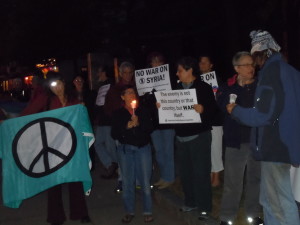Goodbye, Pete Seeger, People’s Champion
To lose Pete Seeger so soon after Nelson Mandela–two great champions of justice and democracy! If you want to know the true definition of an American Patriot, it’s spelled P-e-t-e S-e-e-g-e-r. Not only was he an extremely talented musician and a devoted rabble-rouser on a host of social, labor, and especially environmental causes–for which he suffered greatly in the 1950s and ’60s–and not only can he claim a major role in cleaning up the Hudson River and co-founding the amazing Clearwater sloop and organization and folk festival…he was one of the most humble people I’ve ever met.
I used to see Pete Seeger at the Clearwater Revival, wearing a volunteer shirt and picking up trash. I got to bang a few nails with him once as he was building the Woody Guthrie (one of I think three small boats he built along with the Clearwater and the Sojourner Truth). And I interviewed at least once, saw him perform dozens of times live and numerous more on TV–growing up as a public television kid in New York City, where once the blacklist was lifted, he was frequently found on Channel 13–and hung out with him at some People’s Music Network conferences. He helped start PMN, started Sing Out! magazine, the Newport Folk Festival, a bunch of environmental and peace organizations, and many other ventures for the public good.
His 1963 Carnegie Hall concert is one of the 10 albums I’d absolutely insist on having if I were stranded on a desert island with one CD holder. Among other things, it contains the best of his dozen or so recordings of Wimoweh, long before that other group made it a top-40 hit. I own many other of his records, but that one is a standout.
And Pete walked his talk. Though he could certainly have afforded much grander housing, he lived for the last many decades in a small cabin outside Beacon, New York, on his beloved Hudson River, heating with wood he chopped himself. Though he could have gotten all wrapped up in ego, he spent his entire life championing newer musicians. He helped bring Bob Dylan and Tom Paxton to the world’s attention, as well as later songwriters like Dar Williams and many others.
Pete was one of three amazing lifelong activists born in the spring of 1919 who I knew personally. Miriam Leader (not much known outside of her various home communities) passed about a year ago. And Frances Crowe continues her active work for peace, justice, and the environment. The world is richer because these three people with giant hearts walked its ground. Goodbye, Pete, and thanks for all you’ve done to make my life richer. You’re probably already starting to organize amongst the angels ;-).

